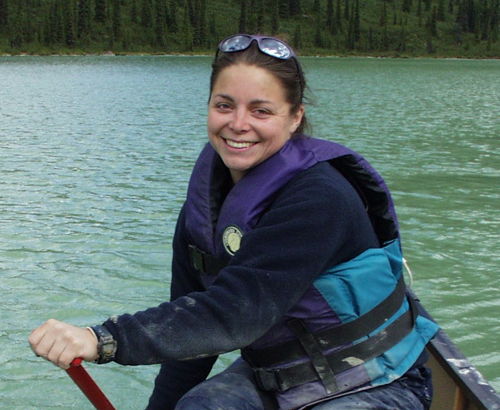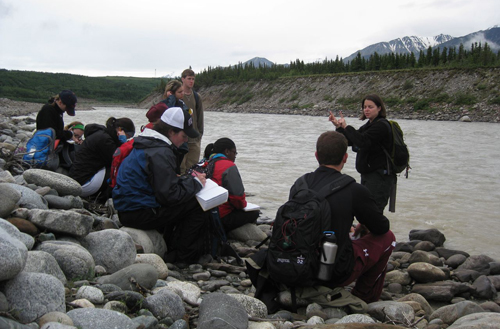
As a second-year undergraduate student, one of Jaclyn Cockburn’s geography professors told the class that there were two schools of thought about climate change. One group argued it was part of a natural cycle; the other hypothesized the changes were man-made. Cockburn thought to herself: “I want to figure it out.”
That decision drove her to forge ahead with her studies, but by the time she finished her undergraduate degree at Queen’s University, “the issues had already been sorted out,” she says. “But I am driven by the need to understand what happens to the physical environment through times of change. I like to talk about environmental change, not just climate change, because everything we do can change the environment. Building a shopping mall in what was once a field changes the environment around it.”
Her research has taken her to the Far North, to areas where the ground is continuously frozen (known as permafrost). At least, they used to be continuously frozen. Now, says Cockburn, “in some areas, where the area was continuously frozen, there are only patches of ground that are permanently frozen.”
What that means, according to her studies, is that more of the substrate and soil is washed away by snowmelt and rain, which means this sediment can end up in rivers, where it affects the aquatic ecosystem. “If air temperatures increase, the land begins to thaw and potentially increases the sediment load,” she explains. The sediment accumulates in the bottoms of lakes, and Cockburn takes samples of these layers of sediment to see how things have changed over time. Some of her samples go back more than 6,000 years.
Gathering these samples has brought her to the high Arctic, Alaska, the Yukon and northern British Columbia, and she has more trips planned to the Far North, where she can study the boundary between areas of continuous permafrost and discontinuous permafrost. “The landscape changes and evolves,” says Cockburn. “We need to learn what those changes will mean.”

After completing her PhD in geography at Queen’s, Cockburn taught in two colleges in the northeastern United States and did some research closer to those locations. Climate change models predict that there will be increased rain in New York and the New England states. Instrumental records from this part of North America date back to the beginning of the 20th century, and her work focused on the patterns in these records compared to the model forecasts.
“We have records of the amount of water discharged by the rivers over 100 years,” she says. “But when we compared the historical data to the models, we found that some places had more water, some had less, and some hadn’t changed at all. This contradicts the model forecasts in some ways, and we wanted to figure out why.”
Cockburn thinks it’s possible that changes in land use may explain why the predictions of the climate change models don’t match the instrument record. Some rivers now have hydro-electric dams and reservoirs, for example. In addition, more rainfall can mean different vegetation grows, absorbing more of the water that would otherwise reach the river.
This research is important, she adds, because many of the policies in the area were set on the basis of water studies completed between 30 and 50 years ago. “If rainfall and water flow are changing, this has huge implications for water policies,” says Cockburn.
Geography can contribute to this discussion because the field is at the important interface of policy and natural sciences, according to Cockburn. “It’s about understanding human interactions with the environment,” she says. “It’s also like the CSI TV show – we have all these tools that we can use to gather data and figure out what happened. Sometimes we work in the lab, sometimes out in the field, sometimes in an archive. We have a huge toolbox of knowledge to help us answer these questions.”
Cockburn is excited to be at the University of Guelph, where she can collaborate with other researchers tackling related projects. “Geography is a very integrative subject. You need to have a foundation in physics, biology, chemistry, history, sociology, political science, economics and math to really move forward. It would be good for the country and the world if more people understood geography. People need to understand their environment and the consequences of decisions that they make.”